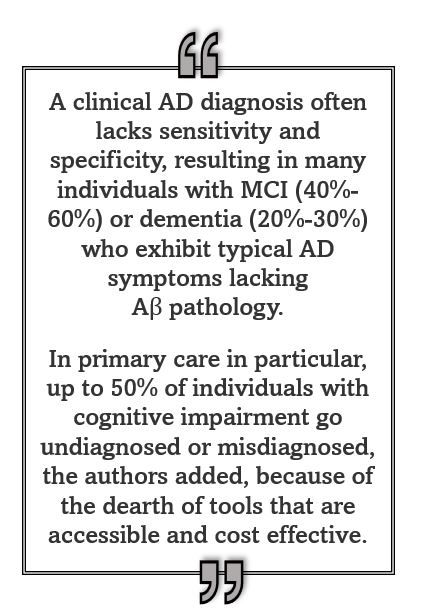- Clinical Technology
- Adult Immunization
- Hepatology
- Pediatric Immunization
- Screening
- Psychiatry
- Allergy
- Women's Health
- Cardiology
- Pediatrics
- Dermatology
- Endocrinology
- Pain Management
- Gastroenterology
- Infectious Disease
- Obesity Medicine
- Rheumatology
- Nephrology
- Neurology
- Pulmonology
Plasma Immunoassay for Alzheimer Disease Found Highly Accurate and is Commercially Available
The accuracy of the test in detecting Aβ and tau pathology underscores its potential to become an accessible and cost effective tool for Alzheimer diagnosis.
A commercially available plasma immunoassay that targets phosphorylated tau217 (p-tau217) was highly accurate in identifying abnormal amyloid β (Aβ) and tau pathologies associated with Alzheimer disease (AD), according to results of a recent study published in JAMA Neurology.
Assay results were comparable to those using cerebrospinal fluid (CSF) biomarkers to determine Aβ and tau PET positivity and the test was able to detect longitudinal changes, including at the preclinical stage. Moreover, the results were reproducible and, according to the study authors, reduced the need for confirmatory testing by approximately 80%.
“A clinical AD diagnosis often lacks sensitivity and specificity, resulting in many individuals with MCI (40%-60%) or dementia (20%-30%) who exhibit typical AD symptoms lacking Aβ pathology,” lead author Nicholas Ashton, PhD, associate professor of neurochemistry at University of Gothenburg in Sweden, and colleagues wrote. In primary care in particular, up to 50% of individuals with cognitive impairment go undiagnosed or misdiagnosed, the authors added, because of the dearth of tools that are accessible and cost effective.
They stress that wider availability of accurate, cost-effective screening “becomes paramount,” as drug trials target preclinical populations with lower prevalence of Aβ abnormalities. The current assay looks promising, despite study limitations the authors identify.

Ashton and colleagues examined data from 3 single-center observational cohorts that included individuals with and without cognitive impairment, grouped by amyloid and tau (AT) status determined by PET or CSF biomarkers. Researchers assessed MRI, Aβ PET, tau PET, CSF biomarkers, and plasma p-tau217 (via ALZpath pTau217 assay). The main outcomes were accuracy of plasma p-tau217 in detection of abnormal amyloid and tau pathology, and longitudinal p-tau217 change according to baseline pathology status. Data analysis took place from February to June 2023.
FINDINGS
The final cohort numbered 786 participants (mean age, 66.3 years; 64% women). The assay demonstrated significant accuracy in identifying elevated Aβ (AUC, 0.92-0.96; 95% CI, 0.89-0.99) and tau pathology (AUC, 0.93-0.97; 95% CI, 0.84-0.99) across the 3 cohorts. Ashton et al found that the accuracies were comparable to CSF measures and superior to brain atrophy assessments. Using a 3-range reference they found high negative and positive concordance with Aβ status—with only 20% of participants classified in an intermediate zone that would require confirmatory CSF or PET analyses.
In a longitudinal assessment, investigators found that the assay exhibited increases only in study participants with Aβ pathology at baseline; further, the greatest rate of annual increase was seen in those with elevated pathology.
“This study is not without limitations. First, one-third of our participants were classified as cognitively impaired, and this may limit our generalizability to the symptomatic stages of the disease, but highlights promise for future preclinical recruitment,” Ashton et al noted.
“In addition, our results cannot be generalized to all individuals without detailed examination in cohorts with a larger representation of diverse ethnic populations. We acknowledge that CSF p-tau181, utilized as a T marker in SPIN [one of the study cohorts], is not interchangeable with other methods that more accurately reflect neurofibrillary tangle pathology.”
Nonetheless, the results “emphasize the important role of plasma p-tau217 as an initial screening tool in the management of cognitive impairment by underlining those who may benefit from antiamyloid immunotherapies,” they concluded.
